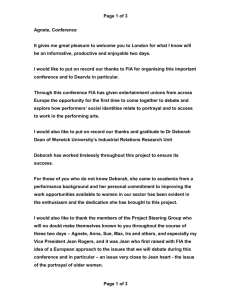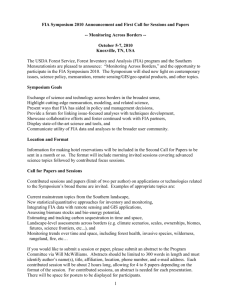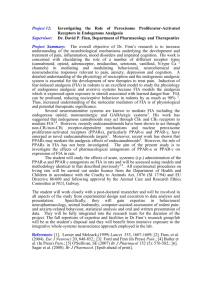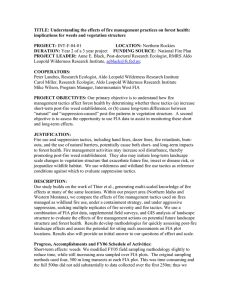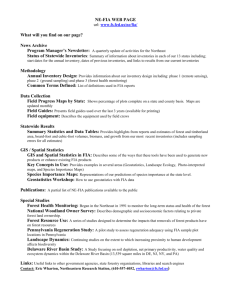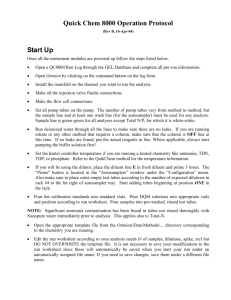Brochure
advertisement
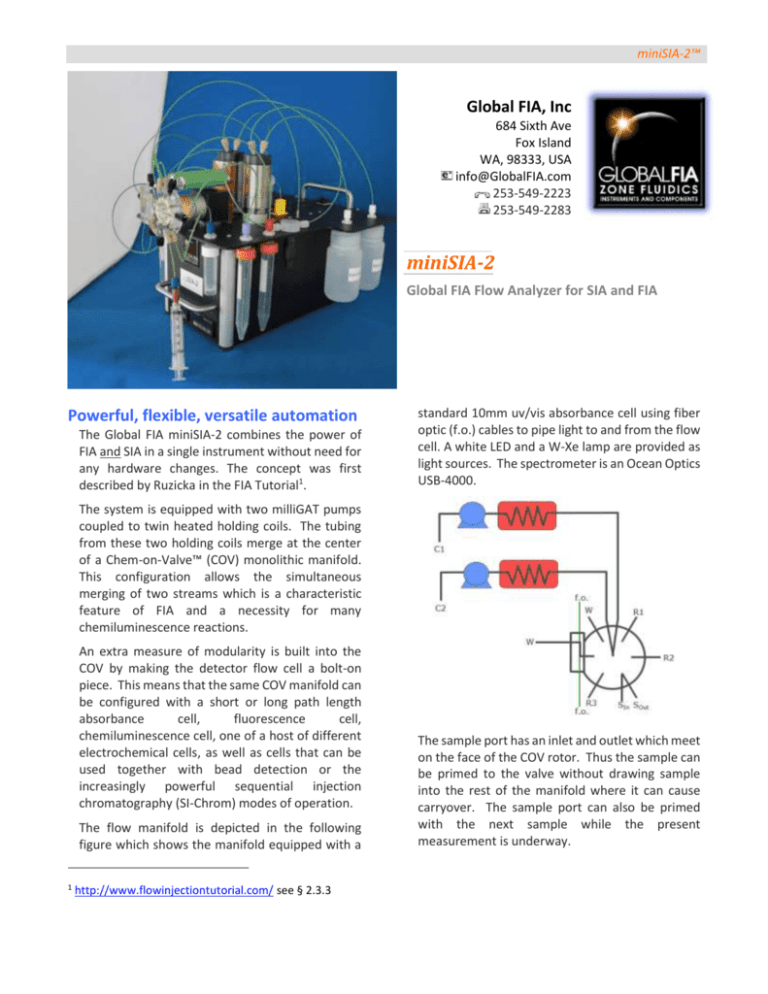
miniSIA-2™ Global FIA, Inc 684 Sixth Ave Fox Island WA, 98333, USA info@GlobalFIA.com 253-549-2223 253-549-2283 miniSIA-2 Global FIA Flow Analyzer for SIA and FIA Powerful, flexible, versatile automation The Global FIA miniSIA-2 combines the power of FIA and SIA in a single instrument without need for any hardware changes. The concept was first described by Ruzicka in the FIA Tutorial1. standard 10mm uv/vis absorbance cell using fiber optic (f.o.) cables to pipe light to and from the flow cell. A white LED and a W-Xe lamp are provided as light sources. The spectrometer is an Ocean Optics USB-4000. The system is equipped with two milliGAT pumps coupled to twin heated holding coils. The tubing from these two holding coils merge at the center of a Chem-on-Valve™ (COV) monolithic manifold. This configuration allows the simultaneous merging of two streams which is a characteristic feature of FIA and a necessity for many chemiluminescence reactions. An extra measure of modularity is built into the COV by making the detector flow cell a bolt-on piece. This means that the same COV manifold can be configured with a short or long path length absorbance cell, fluorescence cell, chemiluminescence cell, one of a host of different electrochemical cells, as well as cells that can be used together with bead detection or the increasingly powerful sequential injection chromatography (SI-Chrom) modes of operation. The flow manifold is depicted in the following figure which shows the manifold equipped with a 1 http://www.flowinjectiontutorial.com/ see § 2.3.3 The sample port has an inlet and outlet which meet on the face of the COV rotor. Thus the sample can be primed to the valve without drawing sample into the rest of the manifold where it can cause carryover. The sample port can also be primed with the next sample while the present measurement is underway. miniSIA-2™ SIA mode In SIA mode, the second pump does not have to be used for one or two reagent assays, but it will facilitate sample splitting for two channel SIA assays. A second pump will also allow automation of on-column separations, gas diffusion and other complex flow schemes. For more details refer to the FIA Tutorial2. Design of Experiment The FloZF - Excel interface provides a powerful means of experimental design for system optimization. Wetted materials The Selection valve and COV wetted materials are COV – Acrylic or Ultem, rotor – Valcon M. Pump wetted materials include PPS, a Teflon, carbon and PEEK composite, Teflon piston tips and a ceramic pump chamber. Tubing is made from PEEK or PFA. FIA mode In FIA mode, sample (red) is aspirated into holding coil 1 followed by the required volume of reagent (blue). Next Pump 1 dispenses while pump 2 aspirates reagent at a flow rate greater than pump 1 dispensing the sample. This results in reagent being merged with sample, forming reaction product (yellow) in holding coil 2. Finally, flow is reversed, sending reacted sample to detector. A simple variation of this sequence allows sample to be merged with a chemiluminescence reagent with rapid transfer to a flow cell for measurement. Software The device control and data acquisition software is called FloZF™ and provides a convenient drag-anddrop means of setting up nested device control sequences. The software is also equipped with powerful data acquisition, calibration and data visualization functions. New functionality allows visualization of multiple peaks in a pseudo chart recorder plot. Physical Specifications Size: 200 mm x 300 mm x 250mm Weight: 7.5kg Power: 110-250VAC, 2.5 A Communication: USB Pricing 1. miniSIA-2 Accessories and spares 1. 2. 3. 4. 5. Fluorescence flow cell with LED excitation $650 Chemiluminescence flow cell $650 Photon counter $2,375 SI-Chrom Kit $call Fittings kit $450 Technical Point of Contact Graham Marshall Graham@GlobalFIA.com The multi-featured calibration functionality accommodates multiple calibration curves thus allowing multi element determinations3. 2 http://www.flowinjectiontutorial.com/ §2.2.13 $call 3 http://www.flowinjectiontutorial.com/ §2.2.16

